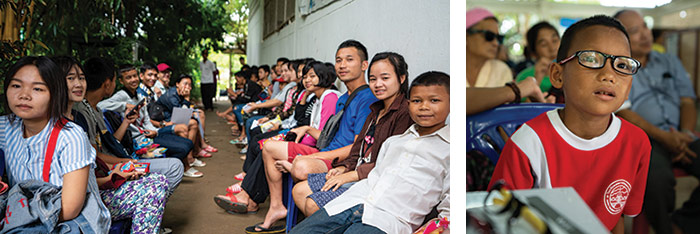
Right: Lu Pwe D. receives his first pair of glasses
As uncertainty continues along the Thailand–Myanmar border, the displaced people in the region have settled in temporary shelters, migrating back and forth between countries daily in search of economic opportunity, health care and education for their children. Resources are scarce, and with so many competing needs, access to quality eyecare and glasses are extremely limited to nonexistent.
ONESIGHT is working to change this and establish a permanent solution by collaborating with local and international organizations. As part of an ongoing three-year initiative, OneSight’s mission is to help over 200,000 displaced people along the Thailand-Myanmar border receive proper vision care. To kick off the project, over 20 volunteers recently traveled to Thailand to provide vision care to over 2,200 people at both the Mae Tao Clinic and a temporary shelter over two weeks. By using a new and more nimble approach to vision care that also utilizes more sustainable solutions, OneSight is working to establish the Mae Tao Clinic as a local center of excellence in the region. The new clinic approach includes training locals for long-term impact, engaging a smaller and more focused volunteer team, leveraging innovative auto refraction equipment, using eyewear products that don’t require a full lab, as well as partnering with Essilor Vision Foundation, Mae Tao Clinic, Suwannimit Foundation and Top Charoen.
Seven-year-old first grade student Lu Pwe D. recently visited the clinic. After being diagnosed with a +4 in both eyes, he received his first pair of glasses and expressed his excitement in finally being able to see clearly, and read his comic books and play his favorite games without straining his eyes. Lu is one of more than 10,000 children in 47 migrant learning centers. OneSight is building a pre-screening program to be completed every two years to train teachers to pre-screen students for vision problems and refer them to Mao Tao Clinic as needed.
During the two-week clinic, over 1,750 patients received glasses. The team was able to successfully fulfill 75 percent of glasses on the spot without a lab using Essilor 2.5 NVG Ready to Clip or reading glasses. Ready to Clip is a selection of pre-cut lenses that are interchangeable and can be snapped into frames allowing the patient to get a customized pair of glasses on the spot, eliminating the need for a lab and making it easier to provide glasses to patients in hard to reach places.
“OneSight is thrilled to kick off a three-year project across the Thai-Myanmar border,” says Wayne Tennent, OneSight’s director of programming for Asia Pacific. “We are dedicated to making sure the neediest of the needy have access to vision care, and we also believe in the importance of building capacity and training along these border regions.” This clinic has been made possible as a result of the generous support of volunteers from Luxottica and Essilor, as well as the partnerships of Essilor Vision Foundation, Top Charoen (donated equipment), Suwannamit Foundation and the Mae Tao Clinic. To learn more about the Thailand Border Project and how to get involved, visit onesight.org/thailand-border-project.
—Christine Yeh











